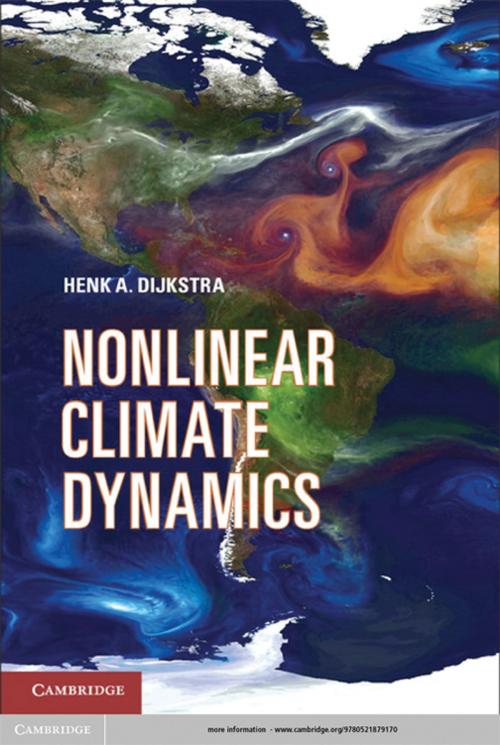Nonlinear Climate Dynamics
Nonfiction, Science & Nature, Science, Other Sciences, Meteorology, Nature| Author: | Henk A. Dijkstra | ISBN: | 9781107241008 |
| Publisher: | Cambridge University Press | Publication: | June 17, 2013 |
| Imprint: | Cambridge University Press | Language: | English |
| Author: | Henk A. Dijkstra |
| ISBN: | 9781107241008 |
| Publisher: | Cambridge University Press |
| Publication: | June 17, 2013 |
| Imprint: | Cambridge University Press |
| Language: | English |
This book introduces stochastic dynamical systems theory in order to synthesize our current knowledge of climate variability. Nonlinear processes, such as advection, radiation and turbulent mixing, play a central role in climate variability. These processes can give rise to transition phenomena, associated with tipping or bifurcation points, once external conditions are changed. The theory of dynamical systems provides a systematic way to study these transition phenomena. Its stochastic extension also forms the basis of modern (nonlinear) data analysis techniques, predictability studies and data assimilation methods. Early chapters apply the stochastic dynamical systems framework to a hierarchy of climate models to synthesize current knowledge of climate variability. Later chapters analyse phenomena such as the North Atlantic Oscillation, El Niño/Southern Oscillation, Atlantic Multidecadal Variability, Dansgaard–Oeschger events, Pleistocene ice ages and climate predictability. This book will prove invaluable for graduate students and researchers in climate dynamics, physical oceanography, meteorology and paleoclimatology.
This book introduces stochastic dynamical systems theory in order to synthesize our current knowledge of climate variability. Nonlinear processes, such as advection, radiation and turbulent mixing, play a central role in climate variability. These processes can give rise to transition phenomena, associated with tipping or bifurcation points, once external conditions are changed. The theory of dynamical systems provides a systematic way to study these transition phenomena. Its stochastic extension also forms the basis of modern (nonlinear) data analysis techniques, predictability studies and data assimilation methods. Early chapters apply the stochastic dynamical systems framework to a hierarchy of climate models to synthesize current knowledge of climate variability. Later chapters analyse phenomena such as the North Atlantic Oscillation, El Niño/Southern Oscillation, Atlantic Multidecadal Variability, Dansgaard–Oeschger events, Pleistocene ice ages and climate predictability. This book will prove invaluable for graduate students and researchers in climate dynamics, physical oceanography, meteorology and paleoclimatology.















